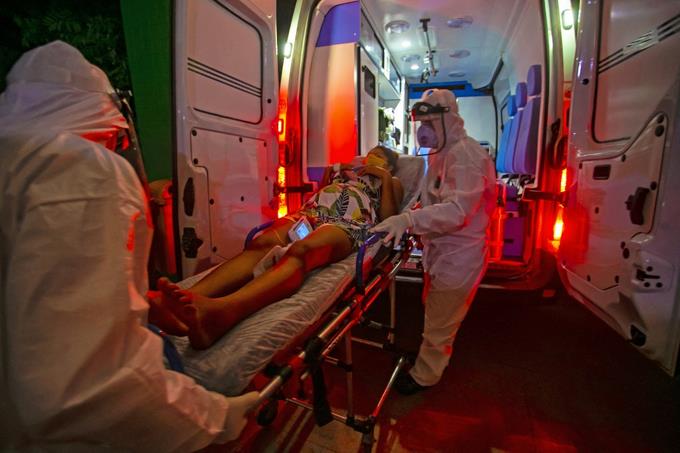On Friday, the World Health Organization (WHO) warned that the Coronavirus epidemic will be killed in its second year more than the first year, as it asked rich countries not to vaccinate their young and give those doses to poor countries that have been overcome by tragedy, such as India, suffering from a devastating return to the epidemic.
Covid-19 has already caused at least 3.3 million deaths worldwide since the end of December 2019, and the emergence of the variants, as well as the disproportionate progress in vaccination campaigns, continues to be a cause for concern.
According to the head of the World Health Organization, Tedros Adhanom Ghebreyesus, “As things go on, the second year of the epidemic will be more deadly than the first year.”
He also called on countries to forgo vaccination of children and teenagers and to donate the doses to the Covax system to distribute to disadvantaged countries.
Meanwhile, several countries in Europe, where the cases have been largely transferred, have reopened their vulnerable economies.
Like Greece, which on Friday lifted all traffic restrictions after seven months in jail for the opening of the long-awaited tourist season. The only condition now to be able to travel to the country is to be vaccinated or to have a negative Coronavirus test.
“Restaurants are open, you can go to the beach, take advantage of the good weather and do some shopping. It’s great to be able to go out again,” says Caroline Falk, 28, a German tourist in Crete.
In Spain, thousands of citizens collapsed on Friday roads to go especially to beaches after the end of months of confinement around the ocean.
Italy announced Friday that it will suspend a five-day quarantine for European tourists from Sunday, while in Portugal hundreds of British tourists are expected to start from Monday after the United Kingdom included this country in the “green list” of countries and territories that have joined it. Its citizens will be able to travel without needing to be quarantined upon their return.
The lifting of restrictions will also allow English fans to travel to Porto (north) on May 29 to attend the Champions League final, which will be played by Chelsea and Manchester City.
On the other hand, Japan extended the state of emergency, which affected ten departments, to three other departments due to the return of cases, ten weeks after the opening of the Joint Operations Office.
In this sense, tennis player Roger Federer declared that the athletes “need a firm decision” about whether or not to hold the Games, and said he would fully understand whether the event, which was already postponed last year, was finally canceled.
“You don’t hear much, which makes me think the Games will take place, although I heard that a lot of people in Tokyo are against the games,” he told Swiss TV, Lehman Bleu.
– Indian alternative in UK –
England is preparing for a new era, with museums, hotels and stadiums reopening in June, thanks to a net drop in the number of HIV cases, after a long confinement and vaccination campaign.
However, British Prime Minister Boris Johnson warned on Friday that the Indian alternative threatens to destabilize the lack of refinement and continues to spread, after an alarming increase in some areas, particularly in northwest London.
For this reason, the authorities decided to embark on an expedited detection campaign.
For its part, France announced that travelers from four new countries (Colombia, Bahrain, Costa Rica and Uruguay) will be subject to quarantine for 10 days, starting from Sunday.
In India, overwhelmed by a devastating wave of the epidemic, vaccination with Russian Sputnik began Friday in that country of 1.3 billion people.
After India’s major cities plunged into chaos – due to shortages of medicine, oxygen and beds for the sick – the virus has continued to ravage the countryside, where it lacks infrastructure.
The dead are buried or left in rivers, while the sick try to treat themselves with home remedies. In recent days, hundreds of bodies have been dumped into the Ganges, raising fears of a catastrophic situation like anywhere else.
“They let people die,” Kidway Ahmed told AFP from his village of Sad Allhpur in the northern state of Uttar Pradesh.
In Colombia, the mayor of Bogotá, Claudia Lopez, has contracted the virus amid a third wave in the country witnessing mass protests against the government of Ivan Duque.
– Mask yes, mask no –
In the United States, where the number of COVID-19 cases has dropped sharply, it was announced Thursday that the recommendation to wear a mask for people who have been vaccinated has been lifted, causing heated discussions and some confusion in the country.
Distribution giant Walmart announced on Friday that the mask is no longer mandatory at its centers, although other companies maintain it.
With more than 584,000 deaths, the United States remains the country worst affected by the epidemic, ahead of Brazil (more than 430,000 deaths), India (258,000), Mexico (219,590) and the United Kingdom (127,640).
On the other hand, from Geneva, the World Health Organization has recommended that even “in cases where vaccination coverage is high, if there is significant transmission, the mask is not removed,” the organization’s chief of urgent health affairs, Michael Ryan, said at a press conference.
“Very few countries are in a position to abandon these measures,” said the scientific director of the World Health Organization, Soumya Swaminathan.
Finally, on Friday, the IndyCar auto racing series, for the second year in a row, announced the cancellation of its Toronto (Canada) street racing, scheduled for July 11, due to the Coronavirus.

“Music buff. Social media lover. Web specialist. Analyst. Organizer. Travel trailblazer.”


:quality(85)/cloudfront-us-east-1.images.arcpublishing.com/infobae/7TXNTX4Z6ZADNGBBYTUT45QETM.jpg)
:quality(85)/cloudfront-us-east-1.images.arcpublishing.com/infobae/TR43PX4FQRCGJOYTK6DVVHHXGE.jpg)


More Stories
Russia intercepted NATO aircraft near its borders and one of its ships violated Finnish territorial waters.
They condemn the irregularities that occurred in the installation of voting tables in the presidential elections in Venezuela.
At least 50 Cubans stranded in Peru after flight to Nicaragua canceled